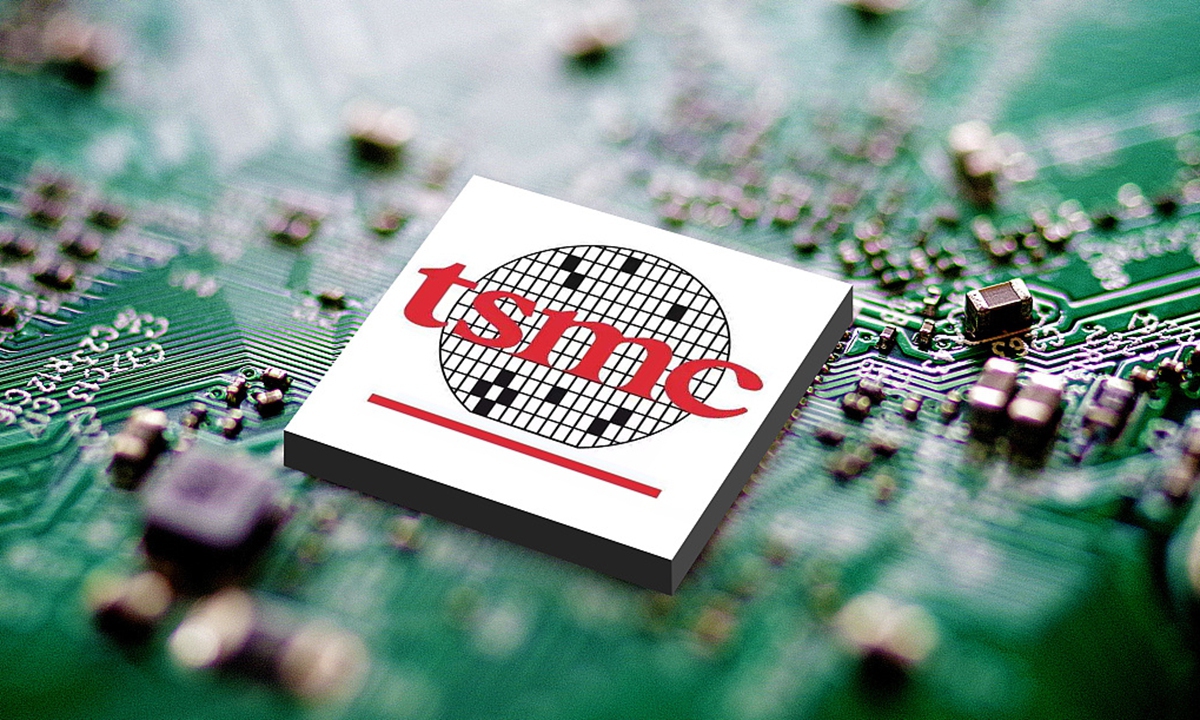
TSMC Photo: VCG
At an event hosted by Washington's Center for Strategic and International Studies, the head of the economic affairs authority on the Taiwan island, Wang Mei-Hua, asserted that "if Taiwan remains safe, global supply chains for vital semiconductors would also be secure," Reuters reported on Wednesday.
In the report, Reuters cited "military pressure" from the Chinese mainland. However, what the report and Wang failed to acknowledge is that the only and biggest threat to the island's safety is posed by the Democratic Progressive Party (DPP) authorities' secessionist words and deeds.
Wang's comments linking the situation in the Taiwan Straits with the island's semiconductor manufacturing sector is nothing but another example of how the DPP authorities have used the region's chip industry as a card to win US support for "Taiwan independence." Such a political calculation is gradually pushing the island's chip industry into a corner, and also posing risks for the global semiconductor industrial chain.
It is undeniable that the island's semiconductor manufacturing sector plays an important role in the global chip supply chain, accounting for more than 60 percent of the global foundry market. However, the chip industry is the product of international industrial and technological cooperation, and it is absurd for the DPP to overestimate the importance of the industrial advantage and try to use it as a bargaining chip to advance its secessionist goals.
Clearly, these DPP secessionists and their foreign backers continue to be ignorant of the fact that China's national reunification and territorial integrity is not to be challenged and nothing will stop the inevitable historical trend that Taiwan will return to the motherland.
It needs to be pointed out that whether the DPP authorities want to cooperate with the US in using the chip industry as a weapon to suppress the mainland's industries or to increase the island's geopolitical importance to gain US support for "Taiwan independence," it will ultimately lead to a dead end for the DPP authorities themselves as well as Taiwan's chip manufacturing sector.
The reason why Taiwan's semiconductor sector can enjoy a significant market share and advantage in the global industrial chain is, to a certain extent, because the region has grasped the opportunity of the specialized division of labor and industrial transfer of the US chip sector in the 1990s. Now things have changed. The US is trying to regain control of the global chip industry, which actually doesn't bode well for the island's chip industry.
It is easy to tell whether the US' interest in the region's chip manufacturing sector is out of kindness or ulterior motives. In late September, US Treasury Secretary Janet Yellen warned that Taiwan region is the sole source of advanced semiconductor microchips, which poses a risk to US national security. The US' 100-Day Supply Chain Review Report said the fact that only TSMC and Samsung can make the most advanced semiconductor microchips "puts at risk the ability to supply current and future [US] national security and critical infrastructure needs."
Moreover, Intel has announced an ambitious roadmap to catch up with and surpass TSMC and Samsung to regain its dominance in chip market by 2025. TSMC supplies more than 50 percent of the world's chips, while Intel's market share is around 10 percent. If Intel overtakes TSMC, what will happen to TSMC?
In August, US President Joe Biden signed the CHIPS and Science Act that includes $52 billion in funding to boost US domestic semiconductor manufacturing, which would put pressure on other main chip producing regions like Taiwan.
Under such circumstances, the DPP's attempt to use semiconductor sector as political capital for "Taiwan independence" will only endanger the island's industries further. The DPP is essentially offering the US the excuse to undercut the region's semiconductor industry.
The US has ratcheted up crackdown on the Chinese mainland's chip industry, while actively instigating tension in the Taiwan Straits. If the DPP authorities continue its secessionist words and deeds, nothing will make it safe - not chips or so-called US "support."




